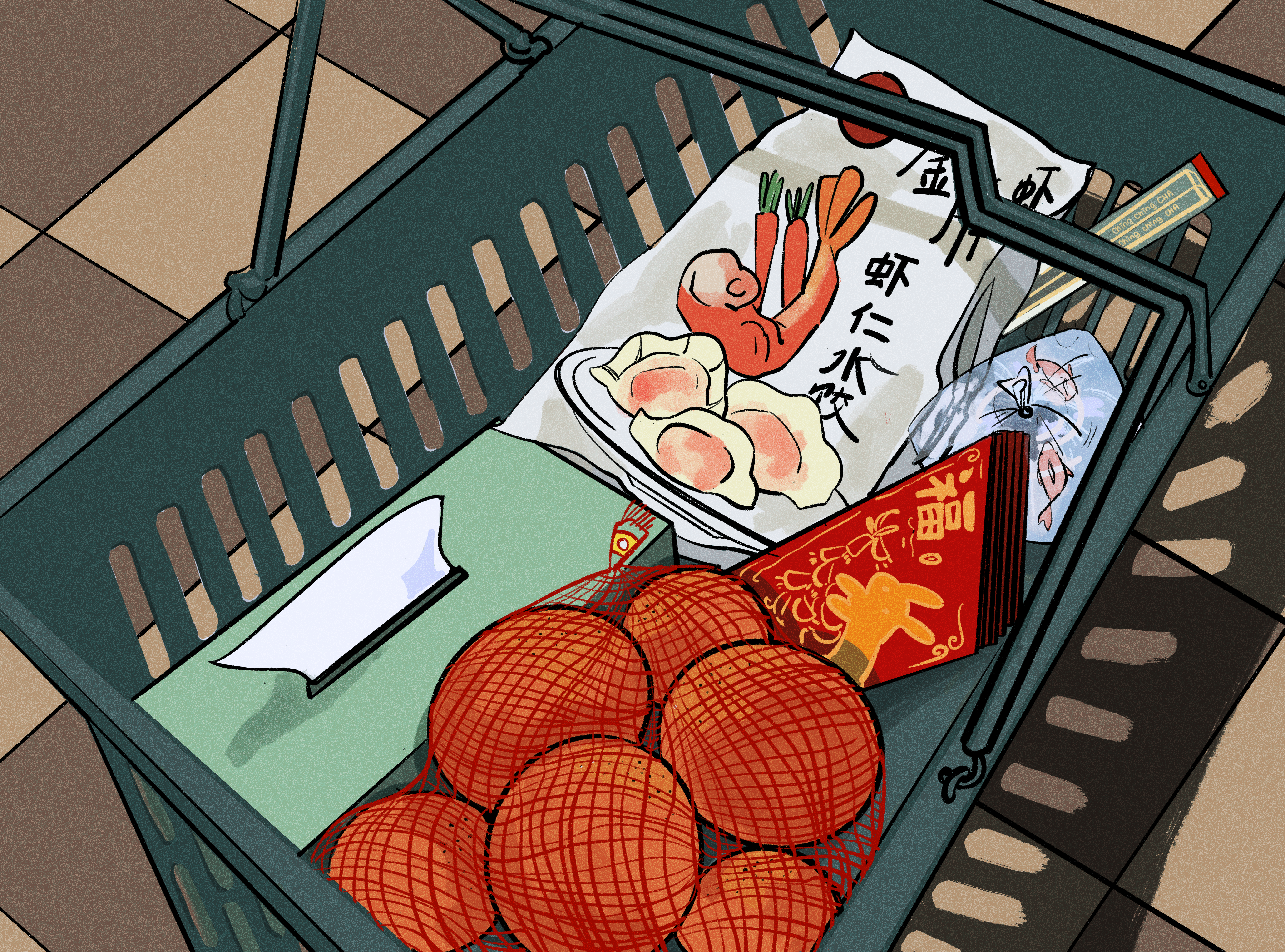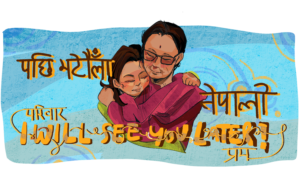A 9:33 a.m. call from my roommate Liv rouses me from the thicket of sleep on the morning of Lunar New Year. We’d made plans to swing by a Chinese supermarket ahead of the potluck I am hosting that night, and I brace myself for a gentle chastising given our scheduled 10 o’clock departure.
Instead, she says, “Are you okay?”
Facing the bleary mumblings of my confusion, she’s quiet: “Check the news.” To the New York Times I go, and headline fragments send my waking brain whirling. 10 dead … 10 injured … Monterey Park shooting … dance studios, ethnoburb, most Chinese, 广场舞, elders, suspect at large.
On the most sacred day of the Chinese calendar—its first—death marks the path forward. I swallow and exhale. “I know,” Liv says. A half-Japanese lesbian Las Vegan, Liv, like so many of us, can trace the journey of identity by mile-markers of gun violence: Pulse—the country music festival—the Atlanta massage parlors. Perhaps it’s mere human instinct to measure ourselves by shared tragedies, but there’s something brutal about the unregulated bullet being a defining genre of timestamp for our generation. There’s the Methodist church and the synagogue; one elementary, and the next. I think of adolescence, and the names and cities pool.
But that morning I curbed tears: The Chinese supermarket in Falls Church is a warm homecoming, its rice cakes and haw flakes aglow, its napa cabbages and puffy tofu all a consumerist totem to a personhood so easily lost in the trappings of Georgetown. It’s the multilingual crossfire between Latino and Vietnamese workers. It’s having 15 brands of dumplings to pick through; it’s taking a wild guess at how your father made something you grew up with; it’s buying a rice bowl with a fish on it, because how have you made it all this way without one? I pick out lotus root and cuttlefish and move on.
Still, mourning coats the store floor. I understand why Michelle Zauner cried in H Mart: An Asian supermarket is both a reminder of how good it feels to be yourself and how long you’ve been away from that self. Ethnic supermarkets can be first temples, unflinching cultural beacons. Freshman year, I used to take a 75-minute bus pilgrimage to get to one, simply to stir up some intimacy of my lineage. So when I wheel my cart in, surrounded by elders, I wonder: When someone kills a woman I could call grandmother—what should I do but weep?
That night, I welcome joy into my home: nine friends—all Asian diasporans—come potluck, peddling heart and gossip. Laughter clinging to the red clothing many of us don for good fortune. We do not participate in the system of grief. But not even 24 hours later, my Twitter interrupts, and I manage my first tears. Here’s Half Moon Bay, 12,000 residents strong, 500 of them Asian. Seven dead at two mushroom farms, including five Chinese and two Latino farmworkers, all over 50. Someone holds me, and I cry without abandon.
How we got here is a top-of-mind question. Political commentators noted the strangeness of two elderly Asian men committing back-to-back mass murders, one in an immigrant neighborhood known to provide refuge, not slaughter. Some have weaponized “Asian-on-Asian crime” to vindicate white supremacist rhetoric and a media economy that has vulcanized hatred. Without proper non-English content moderation, the newfound primacy of algorithm-based platforms like YouTube and WeChat as informational sources for many elders has become dangerous, per Sylvia Chan-Malik. It’s no coincidence Chinese diasporans crowdfunded 80 percent of the donations for the Proud Boys’ medical bills post-Jan. 6 insurrection.
The shootings also collide dynamics of sexual violence and labor, further complicating matters. Some experts probed domestic violence—linked to more than two-thirds of American mass shootings—as a factor at Monterey Park. And the awful Half Moon Bay attack relates to workplace exploitation; it is hard to look past the abhorrent living and working conditions—no running water or insulation, rodent-infested—at one of the farms. Of course, the root issue of all this remains a failure to properly regulate the distribution of guns: The epidemic of gun violence would simply not metastasize in the way it has if gun control was taken seriously.
And then there’s everything here: Why won’t Georgetown couple its declarations of “solidarity with the AAAPI community” with establishing an Asian American Studies program? We need one to deconstruct and address the root causes of violence against Asian Americans. And much like wider reticence to address other forms of racial violence, it seems like few have batted an eye in the wake of what has occurred: a scarring of holiday, a violation of what’s precious. There will not be another Lunar New Year for quite some time unmarked by anxiety about copycat attacks. Violence has visited many marginalized communities at Georgetown—the antisemitic graffiti, the police murder of Tyre Nichols, recent hate speech—and I wonder how solidarity will manifest, if at all. I return to Nicole Chung post-Atlanta: “We all deserve to be safe.”
My friend Katherine urged in The Atlantic that Asian Americans grieve without qualifier—and I agree wholeheartedly; the absence of situational clarity shouldn’t impede the motion to mourn. But even grieving feels hard when doing it communally is a rarity. I’ve long felt complex fractures with Asian spaces at Georgetown. I’m grateful organizations like Asian American Student Association (AASA) have held vigils and dialogues, and I don’t doubt they can be harbors for countless students, especially given internal club transformations since my freshman year. But a messy history with these institutions—one of not feeling like the “right kind” of Asian American, of frictions over the exclusion of non-East Asian ethnicities, of questioning their function—has led to an unmooring. It’s a conversation I’ve had with many of my senior Asian friends—How’d you fall out of love with AASA?—and the answers have ramifications on our relative lack of communal Asian spaces.
It feels telling that my first moment of true shared grieving happens at Ching Ching Cha, Georgetown’s historic Chinese tea house that shuttered Jan. 29 after an astronomical rent increase. Visiting Ching Ching Cha has been a sacred rite; it is one of the only truly Chinese neighborhood fixtures, and entering its doors to speak Mandarin with its waitstaff and perform (relatively) authentic tea practice for two hours constituted its own flavor of cultural healing. Its closing merits its own wave of tears. My Chinese American friend Robin and I stop by on Jan. 24 to bid our goodbyes.
For my final tea, I order the oolong tea tieguanyin (铁观音)—“Iron Goddess of Mercy.” Its mythic backstory involves a poor farmer finding a rundown temple with an iron statue of Guanyin, a beloved Chinese folk goddess personifying compassion, love, and grace. Though he can’t pay for renovation, he comes every day to sweep up and light a candle to the statue—and in return, he’s divinely gifted tieguanyin tea leaves. Perhaps this is the true path of grief: practicing devotion despite struggle, improving what we can. As I drink my fourth, fifth, sixth cup of tea, I feel a candle flame flicker awake inside myself, burning hollow but strong. We’re crying, but we’re here, together.






